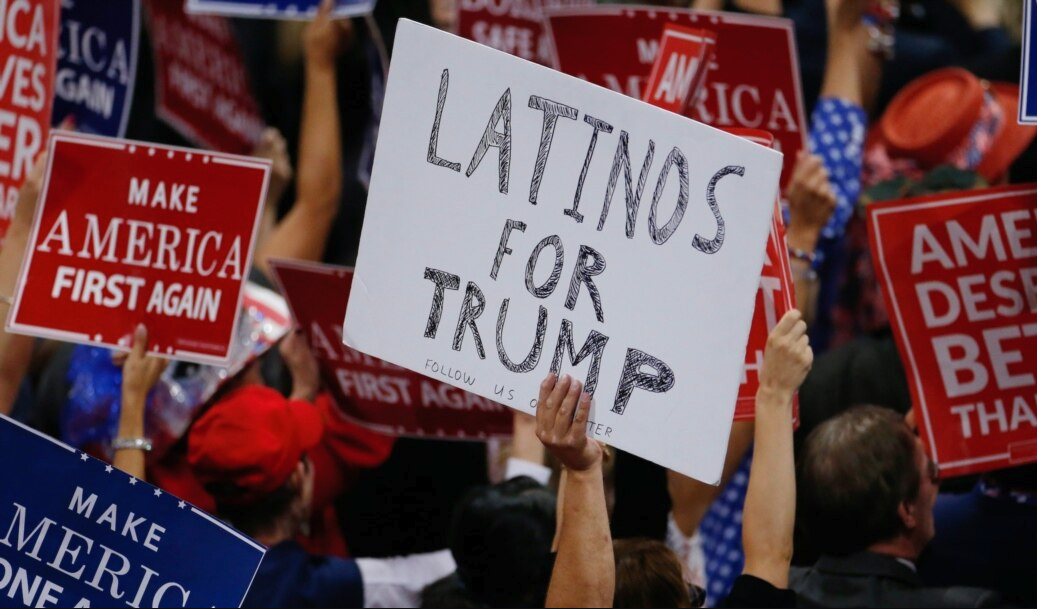During the first days of January, a series of voting intention polls were released ahead of the 2024 U.S. presidential election. The polls reflect Biden’s decline among African Americans and young people under 35. But what is most striking is that Donald Trump outperforms Joe Biden among Hispanic voters by more than five points. The question is, how can a populist candidate who fomented a failed coup, demonizes Hispanics and proposes anti-immigrant, xenophobic, and racist measures in the style of classic fascism increase in popularity? The answer could be that economic and religious priorities are more urgent than a possible future erosion of democratic institutionality.
Trumpism and propaganda go hand in hand. Fascism and Populism have always fused their lies with reality data. In this framework, leaders with dictatorial aspirations appropriate the idea of “democracy,” while those who suggest consensus policies are considered traitors, anti-democratic, and enemies of the people. In this propaganda package, the economy is defined from the leader’s perspective that merges uncertainty with paranoia in a framework of economic reality that for many remains worrisome.
Inflation is the main cause of uncertainty. Throughout Biden’s presidency, inflation has been over 4% annually (over 8% in 2022 alone), rates unheard of in the United States since 1991-1992, when Clinton defeated Bush. Rising costs of food, transportation and utilities, rents, and fuel have disproportionately affected rural workers, employees in the service, health and cleaning sectors, and construction company employees. These are all Hispanic-majority occupations that have not enjoyed wage increases due to inflation.
Trump beats Biden among Latinos
In 2020, Biden got 65% of Hispanic votes while 32% supported Trump, but as of today, Biden would get only about 34% while Trump 39%. The rest support other candidates. On the other hand, 65% of Hispanics have a negative image of Biden on issues of economic management, while a majority think that their economic situation was more favorable during Trump’s presidency. While Biden’s economic policies have lowered unemployment and avoided a recession, the benefits of economic growth and increased investment in 2023 do not seem to have significantly impacted sectors with a Hispanic majority, or at least that is their perception.
Due to the U.S. electoral system, it is not so much the difference in Hispanic vote intention in favor of Trump at the national level that matters, but rather in which key states the Latino electorate prefers Trump. There are more than 36 million Hispanic voters in the country, representing 15% of the total electorate, and they are mostly concentrated in California, Texas, Florida, and New York. And while none of these states is decisive, in all but Florida, a majority of Hispanic voters would vote for Biden. The 2024 election is likely to be decided in the same states that defined Biden’s win in 2020 and Trump’s in 2016: Arizona, Georgia, Michigan, Nevada, Pennsylvania, and Wisconsin.
Even if Biden remembers the “Muslim ban” — banning the entry of migrants from countries with terrorist backgrounds — and other racist insults from Trump, he has to improve his image with Michigan’s Arab and Muslim communities that are highly critical of U.S. support for Israel.
Georgia, and especially Pennsylvania are crucial. But it is in Arizona and Nevada where the Hispanic vote could come to decide the election of the next president. In 2020, Biden won Nevada by a margin of 33,596 votes and Arizona by only 10,457 so a loss of 30,000 to 50,000 Hispanic votes could cost him re-election. Inflation in Nevada is up 20% since 2021, while the Phoenix metro area in Arizona, the area with the largest population and the one needed for Biden to win the state, has seen the largest price increases nationally with monthly spikes of up to 19% in 2022 and 12% in 2023. The large increase in the cost of living has caused a decline in voting intention for Biden against a backdrop of economic growth and job creation.
Racism no longer offends…so much
Trump’s anti-immigration and xenophobic speeches and policies are not enough to dissuade the Latino vote toward the Republican candidate or, seen in another way, they do not seem to be enough reason to mobilize an absolute preference toward Biden.
And in this framework, in addition to the economic factor, it is also necessary to consider the ideological factor. Trump continues to be very popular in the evangelical Hispanic communities that represent the fastest-growing group within the evangelical churches in the United States. About 20% of Latinos in the country are evangelical, and the percentage continues to increase every year. Hispanic evangelical churches, most of them in Arizona, Nevada, Texas, Florida, and Georgia, play a dual role: they militate politically for the Republican Party, registering voters and funding candidates, while at the same time influencing, to some extent, Trump’s rhetoric on immigration issues.
Latino pastors are encouraging people to vote for Trump. But he is not the only leader supported by evangelical churches and conservative Hispanic media. Bolsonaro, Bukele, and for the past two years, Argentine demagogue Javier Milei have been defined as the messianic saviors of Latin America. Since 2021, conservative Hispanic commentators have promoted Milei’s figure through radio channels and social networks. So much so, that Milei was already known among Cuban and Venezuelan anti-communists in the United States before he was elected president of Argentina.
Milei’s campaign and subsequent victory have only increased his popularity on the U.S. Hispanic right. His interview with former Fox anchor Tucker Carlson has been viewed more than 438 million times and his comments on how cultural Marxism, through LGBTQIA+ rights, feminism, abortion rights, global warming, and racial minority rights is corrupting Western civilization resonated strongly with evangelical and conservative Hispanic groups and beyond. What’s more, Javier Milei will be attending CPAC, the most important conference of conservatives in the United States in Washington D.C. at the end of February. And if he attends, he will meet Donald Trump, who will surely use the meeting to increase his popularity among the Hispanic community.
Bolsonaro, Bukele, and Milei are, in part, sons of Trumpism, so their respective popularity among Hispanics reflects the voting intention toward Trump. In this way, there would seem to be a boomerang effect: Trump’s style and rhetoric during his presidency were imitated by the three Latin American leaders during their campaigns. And now, it is Presidents Milei and Bukele, and former President Bolsonaro, who could influence Trump’s candidacy among Latino voters.
*Translated by Janaína Ruviaro da Silva from the original in Spanish.












